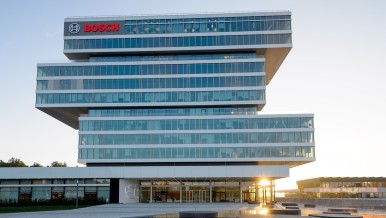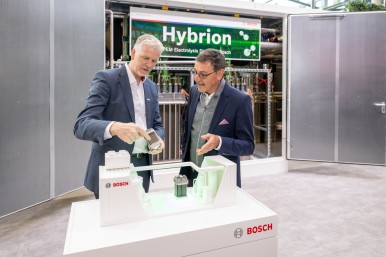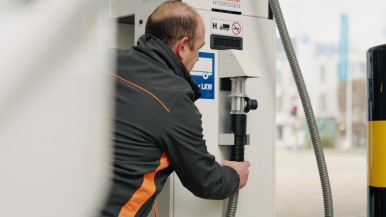What’s involved in purchasing and logistics at Bosch?
Flemming: At Bosch, purchasing and logistics are combined in supply chain management. This ensures stable and sustainable supply chains from procurement source to delivery. For Bosch, this is central to improving quality of life through technology and to the goal of conserving natural resources. In our supply chain management, we work closely with our roughly 225 manufacturing plants and nearly 250,000 customers worldwide. The task is to ensure the availability of components, raw materials, and products in line with customer demand. Here, high quality and competitive prices are important aims, which we pursue in collaboration with our supplier network of more than 35,000 manufacturers and service providers. In addition, our supplier network plays an important part in Bosch’s competitiveness and innovativeness.
How important is sustainability for supply chains?
Flemming: Bosch takes its entrepreneurial responsibility very seriously. This is why its long-term strategy aims to reconcile economic, ecological, and social concerns. With an annual purchasing volume of roughly 50 billion euros, this responsibility reaches far beyond our factories’ gates. Supply chains that manifest a high level of sustainability and social standards are therefore very important for Bosch. Together with our core suppliers around the world, we work to use raw and other materials sparingly, as well as to systematically reduce carbon emissions. We want to achieve this through measures such as consolidated shipments and optimized packaging. For us, there is no question that the only way companies can survive in global competition – and thus contribute to global prosperity – is on the basis of robust and sustainable supply chains.
How does Bosch’s supply chain management respond to geopolitical upheaval and increasingly extreme weather events?
Flemming: Stable supply chains are the bedrock of a sound economy. For Bosch, this means that supply chain management also has to anticipate ever new developments in global trade. In this respect, we pursue a local-for-local strategy, making our global supply chains shorter, more flexible, and thus less vulnerable. With our global manufacturing network, we produce where our customers are. Anticipatory supply chain risk management allows Bosch to react in good time to the risks arising from factors such as supply bottlenecks, natural disasters, and blocked shipping routes. Business relationships based on partnership and respect are crucial in allowing us to work hand in hand with our suppliers if global supply chains or shipping routes are disrupted in this way. In addition, a high degree of digitalization in our supply chains helps us gain clarity in real time about inventories and requirements – from procurement to manufacturing operations to customers.
How does Bosch ensure compliance with legal requirements and with environmental and social standards in its supply chains?
Flemming: As a global supplier of technology, Bosch purchases from companies and service providers in roughly 60 countries. As most of the master data and processes in our supply chain management are digitalized, we are in a position to comply with diverse regulatory requirements. In one respect, for the sake of competitive prices, digitalization helps us cushion the effect of extra administrative work in our supply chains wherever possible. At the same time, it makes it easier for us to comply with reporting requirements and to track sustainability targets in the supply chain. So if suppliers deviate from our quality standards, we give them additional training. We also check compliance with environmental protection regulations and respect for human rights – and this at more than 100 business partners each year. When it comes to reducing carbon emissions, the requirements we set as a manufacturer and supplier have an impact on thousands of suppliers and sub-suppliers of our own – thus multiplying our joint contribution to mitigating global warming.
What are the latest trends in purchasing and logistics at Bosch?
Flemming: Automated planning is playing an increasingly important role in supply chain management at Bosch. The aim is to be able to react even better and more effectively to external factors such as flood damage at suppliers or supply shortages in the market. In keeping with that, we’re extending the integrated planning systems that help us quickly adjust our sources of supply, shipping routes, and choice of manufacturing site if there are any bottlenecks. In our workflows, we systematically rely on cross-function, end-to-end processes, which we are continuously improving. One important element is end-to-end electronic data exchange – starting for example at our suppliers through the SupplyOn digital platform, and continuing from there via our plants to our customers. We expect that the use of generative AI will soon take this automated planning to a new level, and further enhance our supply chains. Examples of where we’re already using AI include voice recognition on supplier hotlines and the extraction of data from drawings and specifications in quality assurance.
Dr. Arne Flemming is the head of supply chain management at Bosch. In this function, he is responsible for managing the Bosch Group’s purchasing and logistics with its roughly 32,000 associates worldwide.







